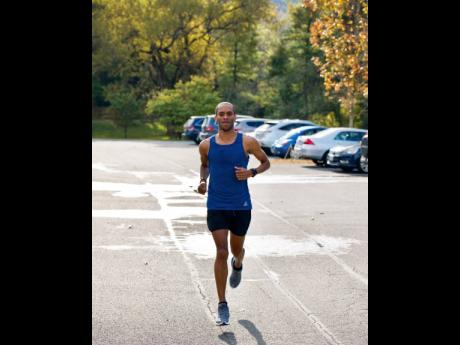Kemoy’s heart to heart - Athlete now spreading message of cardiovascular health awareness
Newly retired track and field athlete, Kemoy Campbell, had been running professionally for parts of his high-school career and during his entire adult life when an unexplained (or unnamed) heart problem brought him to a halt – literally.
“I thought of myself as superhuman, as some would say. I would never get sick, no chronic illness would ever happen to me. And then out of nowhere this happened. So for me, it’s a shock. This is why I’m trying to help to spread awareness,” he shared with The Gleaner.
He collapsed during the middle of a race in February of this year, and after undergoing a series of tests, he was told by medical practitioners that his competitive career in athletics can no longer continue.
The reason?
Doctors found that the left side of his heart was enlarged and his ejection fraction, or the mechanism pumping blood throughout his body, is low.
“When I got to the hospital they told me mine was 25 per cent. A person’s [heart] normally works between 55 and 65 per cent. But mine was all the way at 25 and it stopped there. So that means mine doesn’t work in the same way as a normal person’s heart,” Campbell stated.
And months after finding out there was also a virus in his heart, which may have contributed to his current dilemma, he cannot help but make a possible link between the flu he had and the seemingly sudden onset of issues with his heart.
Most of all, Campbell says he regrets not seeing a doctor to help him get rid of the flu.
“There were a few times I was in practice working out pretty hard and I realised that I couldn’t breathe but I thought maybe if you’re working out hard, it’s going to be hard for you to breathe anyways. So being an athlete, I was kind of used to not being able to breathe because they’re training you in high altitudes and stuff. I wasn’t assuming it was a heart issue,” he stated, lamenting his possible missteps in taking care of his heart.
HUMBLING EXPERIENCE
In any event, he acknowledges that he cannot change what has happened but he says he can warn others, especially other young athletes who may experience what he has.
As someone who exercised regularly, stayed in shape and ate healthily, Campbell believed he was invincible, and this experience, he says, has humbled him.
In addition to an inability to engage in athletics competitively, he can only exercise for recreation, jog for 20 minutes per day and must keep his heart rate at a certain level lest his heart fail him. And now he also wears a Heart Implantable Cardioverter Defibrillator (a battery-powered device connected his heart that will deliver an electric shock if it detects an abnormal rate or if it beats too fast) to administer medicines to help his heart function, especially in the event that he overdoes any form of exercise.
“Let’s be real, nobody goes to the doctor when they have a flu because if you think about it, we’re all thinking it’s something that we could get rid of; our bodies will get rid of it. It’s going to work it out of our system. But if it happened to me, it can happen to anyone else. So I want Jamaicans to consider that,” he said.
In the meantime, he continues to try to maintain a healthy lifestyle by reducing his sodium intake, increasing fruit in his diet and doing the maximum amount of exercise he is allowed to do without causing his heart undue stress, as well as use his time to volunteer with related causes and organisations such as the Heart Foundation of Jamaica, the ‘I Have a Heart’ campaign and Jamaica Moves as a way to spread heart health education and awareness.
When asked what message he would like to share with Jamaicans, Campbell said, “Doctors have told me that from the minute you’re born, your heart starts working a little bit less. So think of it as the older you’re getting, you’re not getting healthier. Start getting those check-ups regularly and be mindful that if anything should happen to your heart or if you die, it doesn’t just happen to you but also to your loved ones.”

